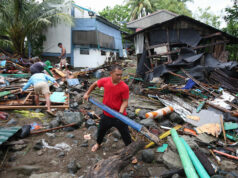Elections could hinder fiscal reforms — Nomura
THE 2019 MIDTERM ELECTIONS could pose some risks to fiscal reforms being pursued by the administration of President Rodrigo R. Duterte, analysts at a global bank said, as the fate of succeeding tax measures will depend on the outcome of the polls.
Nomura economists have flagged politics as one of their biggest concerns for the Philippines next year, saying the outcome of the May 13 elections will determine the fate of reforms in the next 18th Congress.
“The mid terms will likely pose some uncertainty to the prospects for fiscal reform through the rest of President Duterte’s administration,” the Japan-based bank said in its Asia 2019 Outlook published earlier this month.
In May, Filipino voters will have to fill 12 of the 24 Senate seats and fill all of the seats at the House of Representatives, as well as posts for provincial governors, mayors and other local government officials.
Nomura pointed out that it now seems “unlikely” that the second package of the tax reform program put forward by the Department of Finance will be signed into law before the elections, as lawmakers will have to end their sessions early to make way for the campaign period which starts on Feb. 12.
Package two, which aims to reduce corporate income tax rates and revamp the existing scheme for tax incentives and other fiscal perks, recently hurdled the House of Representatives and is now under Senate deliberation.
“This implies that the remaining packages will also face further delays,” Nomura said.
“In that scenario, the pace at which related legislation can be passed will depend on the outcome of these elections, i.e., whether President Duterte’s allies win and he retains his ‘super-majority’ in Congress.”
The difficulty with which the first of up to five planned tax reform packages was approved in both legislative chambers had sowed doubts that Mr. Duterte, whose popularity has remained relatively intact in opinion polls, otherwise had enough political clout to push his reforms in Congress.
The Executive has been pushing for the passage of other tax packages in order to rake in more revenues to finance the administration’s aggressive infrastructure spending plans.
Nomura noted that lawmakers look less interested in pursuing tax reforms despite being backed by the President.
Finance Secretary Carlos G. Dominguez III had told taxmen during the Bureau of Internal Revenue’s 114th anniversary in August that “… there is now more political resistance to succeeding tax reform packages” with the “proximity of elections.”
“Tax policy, as we know, is never the best way to be reelected,” Mr. Dominguez had said.
Nomura, in its report, cited “signs of reform fatigue as the implementation of Package 1 led to some public backlash and the perception that it contributed to this year’s surge in inflation.”
“Given the political cycle, we doubt that legislators will push to expedite the legislative process before May, hence pushing out further the passage of subsequent packages, particularly if President Duterte has less support in Congress after the elections.”
On the other hand, Nomura has acknowledged that the elections will give a one-time boost to consumption as candidates spend for their campaigns, as observed in past election years.
The bank sees gross domestic product growth surging to 7.1% in 2019 from a projected 6.3% this year, before scaling back to 6.8% by 2020. If realized, this would mean that the state’s 7-8% growth target for 2019 would be doable, even if the official 6.5-6.9% goal for 2018 will be missed. — Melissa Luz T. Lopez



